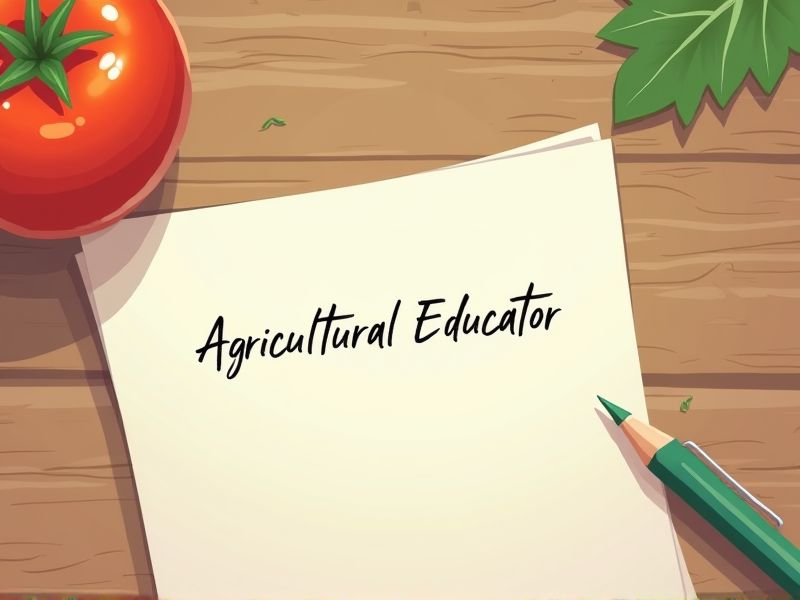
Agricultural education combines practical skills with scientific knowledge, requiring educators to be well-versed in both areas. Certifications ensure that educators have a standardized understanding of agricultural practices and teaching methodologies. They also signify expertise in areas such as sustainable farming, agribusiness, and safety protocols, which are crucial in a rapidly evolving industry. Explore these essential certifications often required for Agricultural Educators.
State Teaching Certification in Agricultural Education
State Teaching Certification in Agricultural Education ensures that educators have met standardized competencies in teaching agriculture-related knowledge and skills. This certification process provides a framework for educators to effectively deliver curriculum aligned with state and national agricultural education standards. Ensuring that teachers hold a certification supports consistency and quality in agricultural education across different schools and districts. Certification also legitimizes the educator's qualifications, enhancing trust and credibility within the educational community and among students.
Agricultural Education Endorsement
Agricultural Education Endorsement ensures educators possess specialized knowledge required for teaching complex agricultural topics. Without it, educators might struggle to provide effective instruction, potentially leading to student disengagement. The endorsement equips teachers to address industry advancements, aligning educational content with current agricultural practices. Accreditation helps maintain a standard of competency, which supports high-quality outcomes in agricultural education programs.
National FFA Advisor Certification
The National FFA Advisor Certification ensures that agricultural educators have the necessary skills and knowledge to guide students effectively in agricultural education. Achieving this certification helps maintain a high standard of teaching quality, enhancing student learning outcomes in agricultural programs. Certified advisors are better equipped to develop leadership and career skills in their students, aligning with the overall mission of the FFA. Consistent certification standards also create a unified framework for agricultural education across different regions.
Certified Crop Adviser (CCA)
Having a Certified Crop Adviser (CCA) can significantly enhance an Agricultural Educator's credibility because the CCA certification demonstrates a comprehensive understanding of agronomy and sustainability practices. This expertise allows the educator to provide research-backed advice, improving crop yields and environmental stewardship. Certified Crop Advisers are well-educated in pest management, soil quality, and the latest agricultural technologies, enabling educators to disseminate accurate, practical knowledge to their students. An Agricultural Educator with CCA credentials can foster trust with farmers and stakeholders, resulting in more effective community engagement and adoption of best practices.
Certified Professional Agronomist (CPA)
A Certified Professional Agronomist (CPA) brings specialized expertise that enhances the curriculum and credibility of an agricultural educator. Their knowledge of sustainable practices and crop management can significantly improve student understanding and application in real-world scenarios. CPAs also keep abreast of the latest advancements in agricultural technology and techniques, enriching educational content. Their professional network can offer students valuable resources and potential career opportunities within the agriculture industry.
Pesticide Applicator License
An Agricultural Educator requires a Pesticide Applicator License to ensure they provide accurate and safe instruction on pesticide use, given the complexity and risks associated with chemical handling. This license ensures compliance with legal standards, preventing potential litigation and environmental harm. Proper certification demonstrates credibility and authority, enhancing trust among students and stakeholders. It also equips educators with current knowledge on best practices, which promotes sustainable and responsible farming techniques.
Certified Irrigation Specialist
A Certified Irrigation Specialist has in-depth knowledge of water management techniques, which is crucial for an Agricultural Educator aiming to optimize crop yield and conserve resources. Their expertise allows them to implement systems that align with sustainable agriculture practices, reducing water waste. They also bring the ability to troubleshoot and maintain complex irrigation systems, minimizing downtime and enhancing productivity. With climate change impacting water availability, their skills help in educating farmers on adapting to new environmental challenges.
Food Safety HACCP Certification
HACCP Certification equips agricultural educators with the knowledge to identify and mitigate food safety hazards, ensuring safe consumption of agricultural products. This certification fosters trust among students and stakeholders by demonstrating a commitment to food safety standards. Armed with HACCP training, educators can effectively integrate food safety principles into their curriculum, enhancing the educational experience. Certification also aligns agricultural education with industry standards, preparing students for real-world food safety challenges.
Organic Farming Certification
Organic farming certification is crucial for agricultural educators because it ensures they possess a validated understanding of organic practices, allowing them to teach students effectively. Certified educators can demonstrate compliance with current organic standards, which enhances the credibility of the educational program. Students learn the importance of sustainable agriculture practices when guided by certified professionals, leading to a more environmentally conscious farming community. Certification also supports educators in accessing updated resources and networks related to organic farming innovations.
Sustainable Agriculture Certification
Sustainable Agriculture Certification equips agricultural educators with up-to-date practices that promote environmental stewardship, leading to better resource management education. The certification ensures that educators can effectively teach techniques that enhance soil health, which in turn improves crop yields and farmer profitability. Awareness and training in sustainable practices also enable educators to guide communities in reducing their carbon footprint, impacting overall climate resilience positively. Certified educators can leverage their credentials to build partnerships with eco-conscious businesses, fostering a network focused on long-term agricultural sustainability.
Summary
When you, as an Agricultural Educator, obtain certifications, your credibility among peers and students increases, leading to enhanced trust and engagement. Certification often results in expanded knowledge and skills, which can improve teaching effectiveness and curriculum development. Your enhanced expertise can provide better career prospects, potentially leading to new job opportunities or promotions. Employers may observe improved program outcomes, as certified educators often employ advanced, evidence-based techniques in their teaching.
